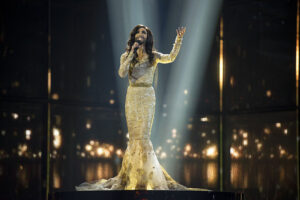
Every year, the Eurovision Song Contest draws millions of viewers eager to experience the diversity and creativity of musical talent from across Europe – and get silly drunk while waving flags.
Success on the Eurovision stage requires a unique blend of elements catering to a broad audience while leaving a lasting impression. We’ve scanned the web to find experts willing to share insight into what makes for a winning song.
Memorable Melodies
A memorable melody is essential for Eurovision success, as it’s the element that will stick in the minds of the audience and the jury. Expert musicologist Dr Helena Rydén explains, “In Eurovision, a catchy, easily recognisable melody can make the difference between a good song and a winning song.”

Alexander Rybak’s “Fairytale” (2009) captivated viewers with its unique blend of folk elements and an instantly memorable melody that helped secure Norway’s victory.
Strong Chorus
A powerful and memorable chorus is crucial for Eurovision success, as it’s the part of the song that people are most likely to sing along to. Songwriting coach Pat Pattison emphasises the importance of a strong chorus: “A winning Eurovision entry needs a chorus that’s instantly catchy and emotionally impactful.”
 Loreen’s “Euphoria” (2012) showcased an anthemic chorus that resonated with the audience and contributed to Sweden’s win.
Loreen’s “Euphoria” (2012) showcased an anthemic chorus that resonated with the audience and contributed to Sweden’s win.
Powerful Vocals
A strong vocal performance is crucial to success. Singers must be able to convey emotion and connect with the audience, drawing them into the song’s story. Ruth Lorenzo, a Spanish singer who competed in the 2014 contest, believes that “Eurovision is all about the voice, and the audience needs to feel your passion and emotion through your vocals.”
 Austria’s Conchita Wurst demonstrated this powerfully in 2014 with a soul-stirring rendition of “Rise Like a Phoenix,” showcasing vocal prowess and conveying a message of strength and resilience.
Austria’s Conchita Wurst demonstrated this powerfully in 2014 with a soul-stirring rendition of “Rise Like a Phoenix,” showcasing vocal prowess and conveying a message of strength and resilience.
Unique and Authentic Presentation
Eurovision is known for elaborate staging, but the most successful acts often have a genuine connection with their song and showcase their authenticity. Music journalist Mira Ivanović notes, “Authenticity can set you apart from the competition, allowing the audience to connect with you on a deeper level.”
 Salvador Sobral’s intimate performance of “Amar Pelos Dois” (2017) showcased his emotional connection to the song, ultimately leading to Portugal’s first Eurovision victory.
Salvador Sobral’s intimate performance of “Amar Pelos Dois” (2017) showcased his emotional connection to the song, ultimately leading to Portugal’s first Eurovision victory.
Engaging Stage Performance
An engaging and visually appealing stage performance can elevate a song and capture the attention of both the audience and the jury. Choreographer and creative director Sacha Jean-Baptiste explains, “A well-executed stage performance can make a good song unforgettable, increasing its chances of success.” Thomas G:son, a renowned Eurovision composer, adds that “It’s essential for the artist to bring energy and charisma to the stage. A great performance can elevate a good song to a winning one.”
 Måns Zelmerlöw’s “Heroes” (2015) featured innovative visual effects and choreography, contributing to Sweden’s win.
Måns Zelmerlöw’s “Heroes” (2015) featured innovative visual effects and choreography, contributing to Sweden’s win.
Uniqueness and Originality
Standing out from the competition is vital in a contest with many competing entries. Unique and original songs leave a lasting impression on viewers who count for half of the vote in the Grand Final. As an expert commentator and Eurovision enthusiast, Dr Eurovision (aka Dr Paul Jordan) notes, “It’s important to take risks and showcase something different. A song that’s fresh and innovative can capture the imagination of the audience.”

A striking example is Netta’s 2018 victory with her song “Toy,” which featured an eclectic mix of vocal looping, beatboxing, and quirky lyrics. The Israeli singer’s unique style set her apart.
Cultural Representation
Incorporating elements of a country’s culture can create a unique and memorable performance. Ethnomusicologist Dr Susana Zapke argues, “Eurovision offers a platform for artists to showcase their nation’s identity and traditions, which can resonate with viewers.”
 Marija Šerifović’s “Molitva” (2007) fused Serbian folk elements with a modern pop sound, resulting in Serbia’s first Eurovision win.
Marija Šerifović’s “Molitva” (2007) fused Serbian folk elements with a modern pop sound, resulting in Serbia’s first Eurovision win.
Where Things Went Wrong
While many acts have successfully combined these elements, others failed miserably. One example is the United Kingdom’s 2003 entry, “Cry Baby” by Jemini, which finished last with zero points. The duo’s off-key vocals, uninspired melody, and lacklustre stage presence failed to engage the audience or impress the judges.
 Similarly, Ireland’s 2018 entry, “Dustin the Turkey,” was an ill-conceived attempt at humour and satire that didn’t resonate with the broader audience. The novelty act, featuring a puppet singing about European politics, failed to qualify for the final, demonstrating that more than novelty alone is needed to achieve success at Eurovision.
Similarly, Ireland’s 2018 entry, “Dustin the Turkey,” was an ill-conceived attempt at humour and satire that didn’t resonate with the broader audience. The novelty act, featuring a puppet singing about European politics, failed to qualify for the final, demonstrating that more than novelty alone is needed to achieve success at Eurovision.
While there is no guaranteed formula for success at the Eurovision Song Contest, a combination of factors can improve the chance of hitting a home run. Above all, nobody wins by boosting their odds by placing bets to look like they might, bribing jury members or throwing hissy fits for attention. That’s just the fun bit for the rest of us to enjoy.


